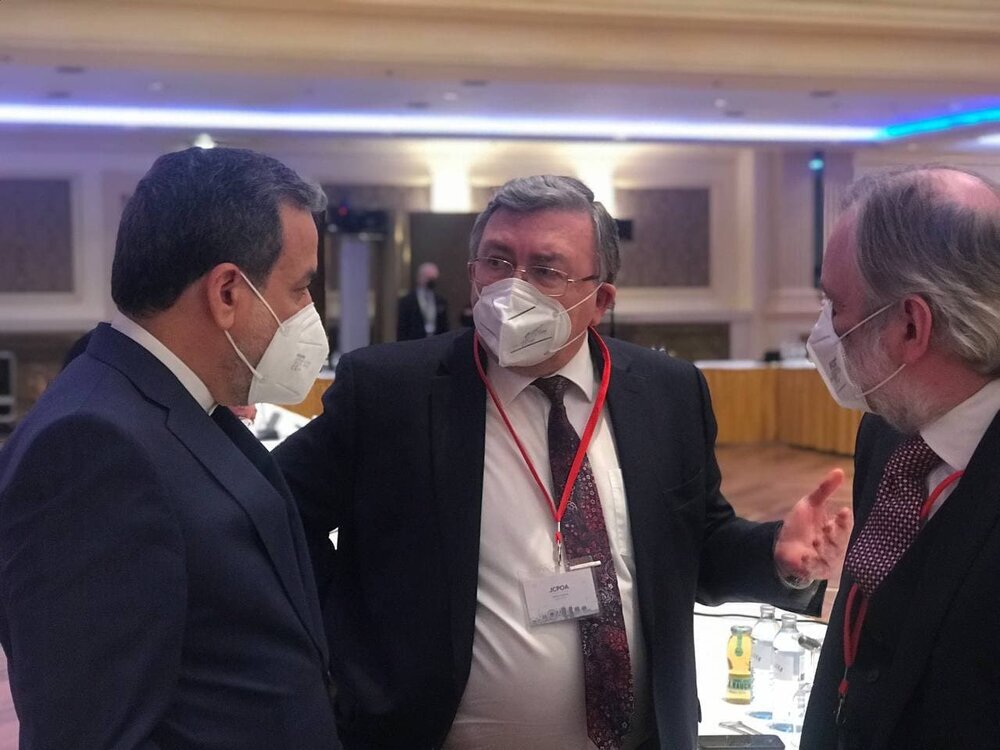Russia says Vienna talks making progress

TEHRAN – The current nuclear talks over Iran’s nuclear program in Vienna are moving forward, a senior Russian diplomat said as the third round of the talks were concluded earlier this week.
The diplomat, Mikhail Ulyanov, who serves as the Russian envoy to the Vienna talks, said he was surprised that some commentators claimed that the Vienna talks are collapsing. The talks, Ulyanov asserted, are making progress instead.
“Read with surprise comments of some analysts who claim that the Vienna talks on JCPOA are ‘collapsing’. This is wishful thinking of those who are against efforts to strengthen nuclear non-proliferation regime based on NPT. In real life the talks are making progress,” he said on Twitter.
Nuclear negotiators from Iran and the remaining parties to the 2015 nuclear deal held another meeting earlier this week to discuss the ways to revive the 2015 nuclear deal, officially known as the Joint Comprehensive Plan of Action (JCPOA).
Ulyanov held a meeting with Iran’s Deputy Foreign Minister Seyed Abbas Araghchi, who is leading the Iranian negotiating team, hours before the start of the third round of nuclear negotiations. The top Iranian nuclear negotiator said his meeting with Ulyanov was “relatively long.”
“During this meeting, the two delegations re-coordinated their positions and stressed the need to maintain the closeness of the positions of the two countries,” Araghchi said in a statement. “The Russian side also reiterated its support for the nuclear deal and the need for the United States to lift sanctions on Iran.”
The JCPOA Joint Commission convened a meeting on Saturday to “take stock of intermediate results of the Vienna talks on full restoration of the nuclear deal,” according to Ulyanov.
Ulyanov also held an informal meeting with the U.S. and the remaining parties to the JCPOA, before the JCPOA Joint Commission.
“JCPOA participants held today informal consultations with the #US delegation at the Vienna talks on full restoration of the nuclear deal (without #Iran who is still not ready to meet with US diplomats),” the Russian diplomat said on Twitter hours before Iran and the P4+1 group of countries hold another meeting of the JCPOA Joint Commission.
Last week, negotiators at Vienna talks announced the establishment of another expert group in addition to the existing ones. So far, the Vienna talks have resulted in the establishment of three expert-level working groups, one to identify the sanctions that the U.S. should remove in order to return to the JCPOA, and another to specify the nuclear activities that Iran should reverse. The third group was set up recently and is called “Expert Group on Practical Arrangements,” which is formed with the aim of holding talks on the practical arrangements required for the removal of sanctions and then the U.S. return to the JCPOA.
According to Araghchi, these groups held bilateral and multilateral meetings to announce positions and study draft texts over the past few days.
Following the Saturday meeting of the JCPOA Joint Commission, it was agreed that the talks will be resumed on Friday, according to a statement issued by the Iranian Foreign Ministry on Saturday.
According to the statement, participants discussed the latest developments related to the discussions of the three expert groups.
“It was decided that after this meeting, the delegations would return to the capitals and that the talks would resume next Friday,” the statement continued. “The parties agree that in the next round of talks, work should continue more quickly and seriously.”
The Vienna talks have not resulted in a new agreement yet but they are expected to lead to a new one, according to a senior Iranian lawmaker.
The lawmaker, Alireza Salimi, who is a member of the parliament’s presiding board, said the new agreement must be submitted to the Iranian parliament for ratification.
“Since the Vienna talks are supposed to lead to an agreement and the parties will sign it, it must be ratified by the Islamic Consultative Assembly because it is a new and binding agreement, so if the legal issues mentioned in the agreement are not included, it will face problems in the Assembly,” he said.
He pointed out that the Vienna Agreement would have no value without parliamentary ratification.
“If the sanctions are to be lifted step by step, or partially, or if the lifting of sanctions is only for a period of 120 days and tougher sanctions are imposed, we will certainly not accept the Vienna agreement,” he continued.
Salimi said the Vienna talks only have a window of three months opportunity to succeed, potentially hinting that if these talks fail to result in a deal within three months, they will not continue.
“In the Vienna negotiations, the law of the parliament and the policies announced by the Leader must be observed, and any agreement beyond the framework set by the parliament will not be accepted,” he told the Islamic Consultative Assembly News Agency (ICANA).
